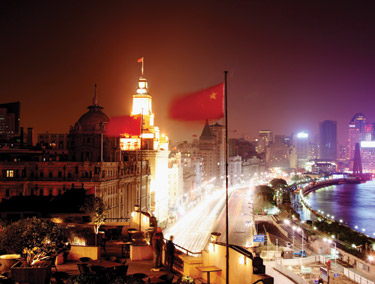China is undergoing an infrastructure building campaign unrivaled in recent history. When the country first opened its doors to the outside world in fits and starts in the ’80s and ’90s, large transportation providers, like DHL, UPS, FedEx and Exel, began vying for a toehold on the mainland through joint ventures with the various government transportation groups, like Sinotrans, and newly-privatized enterprises. It was as if China had re-awakened when Deng Xiaoping, the late leader of the Communist Party of China, proclaimed, “To get rich is glorious!” during his famed Southern Tour in 1992.

Today the east coast highway and port system has reached or surpassed international standards around the centers of commerce in Beijing, Shanghai and the Pearl River Delta in Guangdong Province, and the government has slowly allowed international firms to operate independently of their joint venture partners. With China’s entry into the World Trade Organization in 2004, restrictions on foreign direct investment were officially loosened, but multi-nationals were still functionally required to navigate the bureaucracy of multiple layers of government.
According to Datamonitor, the Chinese logistics market is projected to grow in the low teens through 2010 after posting a remarkable 22.6 percent compounded annual growth rate from 2001 to 2005. Today China has 16 major ports and a shipping capacity of 50 million tons per year. It also has a network of over 30,000 kilometers of highways, second only to the United States in total kilometers. Despite this phenomenal growth, logistics costs remain high—representing 20 percent of GDP in China versus 11 percent in Japan—when compared to overall production.
Market Remains Fractured
One would expect rapid consolidation among logistics providers seeking to capitalize on China’s growth. Yet in the trucking world, a single provider has yet to emerge with a comprehensive network. There are over 5 million trucking companies, with each owning an average of 1.8 trucks. The top 100 logistics providers only comprise 5 percent of the total logistics market.
These smaller trucking firms are often the lowest cost provider with low overhead and expertise within a single area. Their expertise includes relationships with toll collectors and inspectors that give them an advantage over a trucking firm from another region. With such low barriers to entry and local protectionism, it is hard for larger players to compete. In the case of bulk commodities like cotton, factories will often manage the supply chain between the mill and the port because they can get the lowest prices with their existing carriers.
Level of Automation Remains Low
Although many logistics providers that move high-value merchandise have invested in the latest tracking systems, many of the bulk commodity shippers are not using available technology to provide shipment visibility. Much of the tracking is still done the old-fashioned way with a clipboard and a marker. If cost is the primary buying motivation and labor costs are low, there is not a short-term payoff for investing in automation. Why would you buy a forklift if you can hire a team to stuff a container by hand for a fraction of the cost?
Overloading Persists
In China it is common practice for truckers to overload their trucks by two to three times the legal limit to maximize their asset usage and eke out a profit in a fiercely competitive market. The central government has issued tougher laws to ensure the safety of drivers and reduce damage to roads, but they are lax in the enforcement of these regulations because they know many small truckers would go under if they adhered to the weight limits. Meanwhile the local government has an incentive to allow overloading to continue as tolls are collected on the total weight of the load and they are not responsible for road repairs. This practice reminds one of the Chinese saying, “The hills are high and Beijing is far away.”
What to Do?
There is no “one size fits all” solution. Instead of a China logistics strategy, have a unique strategy or partner for each region. Find logistics providers who have worked with firms that you trust.
Also keep in mind this is not the West. Proceed with caution and realize that corruption is widespread, contracts are hard to enforce, and management talent is scarce.
As in any business, logistics is a game of relationships. This is even more appropriate in China where a long-term relationship may mean the difference in your product being held up in port rather than getting delivered to a factory on time. Invest in a long-term relationship with a company that is willing to establish a mutually beneficial partnership.
Oscar Atkinson traveled with 19 classmates to China as part of Professor Ray Friedman’s Doing Business in China course. The highlight of the week-long trip was a visit to international logistics firm Mallory Alexander with Michael O’Brien, MBA’08, Jen Smith, MBA’08, and Scott Hall, MBA’08. Atkinson now works for SEACAP Financial, an investment bank in Memphis, Tenn. specializing in the sale and acquisition of family-owned companies. Atkinson can be reached at oscar.atkinson@seacapfinancial.com.
